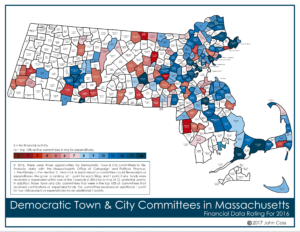
41% of Democratic town & city committees are active in Massachusetts.
That’s my latest conclusion from reviewing the financial records for democratic local committees for 2016 from the Massachusetts Office of Campaign and Political Finance.
Here’s what I base my data on:
In 2016, there were three opportunities for Democratic Town & City committees to file financial data with the Massachusetts Office of Campaign and Political Finance.
- Pre-Primary
- Pre-Election
- Year End
In each report period a committee could file receipts or expenditures.
I used this data to build a map of town & city committees in Massachusetts and rate each local political committee. Giving a ranking of one point for each filing, and one point if any funds were received or expended within one of the 3 periods in 2016 for a total of 12 potential points.
In addition, those town and city committees that were in the top 10% of committees that received contributions or expended funds, the committee received an additional 1 point for top 10% receipts or expenditures for an additional 2 points.
One reason I’ve settled on financial data as a way to judge activity at a local political committee, is because after creating my first map of organized Democratic Town & City Committees in Massachusetts. I discovered that in Connecticut doesn’t have a requirement for towns to file a statement of organization as towns and cities do in Massachusetts. In fact there are a few differences with how local political committees are run in Connecticut compared to Massachusetts. For one, there are primaries every two years in Connecticut, while only every four years in Massachusetts.
As I intend to compare a number of States in their level of local political committee activity, I need metrics that cut across the States. Financial data, the amount of expenditures spent and contributions received is data that each state will collect.
Financial data is a good indication of what local committees are doing. If all a committee does is collect contributions, and doesn’t spend anything, is that committee really active? I think not, so expenditure is probably the most important metric. And once you do start spending money, you need more money, so contributions follow.
The Missing Data In Braintree
If a committee is filing financial reports with its town, that means there’s enough activity happening to indicate the committee must be doing something.
Though my own town of Braintree hasn’t met as a committee for a number of years, our Treasurer continues to file reports despite the fact that there’s no activity. No money spent, no money collected.
So Braintree would still receive 3-6 points for filing. Except, in pulling my data from the State website, there’s no activity registered by the state in their complete local political committee spreadsheet. Yet for Braintree I do see evidence of filing. So, either the data isn’t being pulled, or its because Braintree hasn’t filed its Statement of Organization since 2012.
The Map
Here’s the Map of Massachusetts where all of the towns and cities that have turned in financial data are colored in on a scale of 1 to 14. 1 being lowest, and 14 highest. The scale is colored, 1 is dark red, and 14 is dark blue. Any blank or white towns didn’t submit data, or like Braintree, there’s some sort of error and the data isn’t being pulled by the State.
Now, I used a scale of red to blue, but I’m open to ideas about the color system, one party member suggested starting with orange or yellow. What do you think of the map, and the state of the party in MA?

